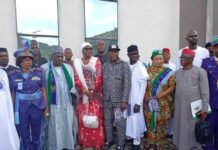Biosafety Agency seeks to allay fears over safety of GMOs through training
The National Biosafety Management Agency (NBMA) on Thursday in Abuja organized a one-day training program for its staff members to effectively carry out risk assessment for Genetically Modified Organisms (GMOs) products in the country.
The “risk assessment” staff training was aimed at allaying growing fears about the safety of GMOs to humans and the environment.
The program is part of the mandate of NBMA which is aimed at strengthening the capacity and proficiency of the agency’s staff to be enable them to handle the risks and challenges associated with GMOs.
Dr Rufus Ebegba, Director-General of NBMA,, while speaking at the event, said the training would help participants understand the various principles behind risk assessment and management .
Ebegba noted that there was need to constantly upgrade and strengthen the capacity and proficiency of the agency’s staffers to be enable them to handle challenges associated with GMOs.
He explained that three are three pillars of biosafety risk assessment, which he identified as risk assessment, risk management and risk communication.
“The risk assessment is basically to look at any GMOs before they are used or deployed for any purpose to consider whether those GMOs are harmful to human health or to the environment.
“Risk assessment is to determine whether there are harms. Iif there are risks, to quantify the risks at various levels.
“ Also whether there are risk management strategies to mitigate the risks that are associated with the organization. If there are management strategies, the product can still be adopted.
“This training basically is to enable the staff of the Agency to be able to develop the capacity to carry out risk assessment review.
“Any GMOs that are being introduced, the applicant is expected to carry out the risk assessment and the dossier is very crucial to the Agency for us to review the findings to identify whether there are risks, and if there are risks, we will find out whether it can be managed,’’ he explained.
Also speaking, Mrs Bello Scholastica, NBMA’s Head of Planning, Research and Statistics, said that it was important to carry out risk assessment because of the concerns about GMOs products for safety of humans and the environment.
“This training is to ensure that we have a crop of young men and women who are able to effectively carry out a risk assessment so that whatever GMO is approved in Nigeria, it is 100 per cent sure to be safe for humans and the environment,’’ she said.
Ehikwe Darlington of Native Base Limited enjoined the participants to pay attention to the training to equip themselves with the capacity to identify the hazards associated with GMOs and its management.







